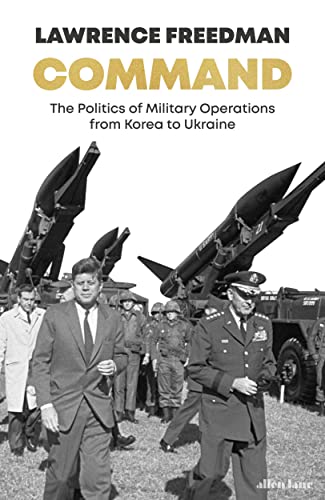
Command: The Politics of Military Operations From Korea to Ukraine. By Lawrence Freedman. Allen Lane, London 2022.
Reviewed by Tim Coyle
Lawrence Freedman is Emeritus Professor of War Studies at King’s College, London. He was the official historian of the Falklands Campaign and a member of the Chilcot Inquiry into British involvement in the 2003 Iraq war.
He has written extensively on Cold War nuclear strategy; his published works include The Future of War; a History, Strategy; A History and Choice of Enemies; America Confronts the Middle East. With is background, Freedman leads the reader through 15 military campaigns in which he examines the relationships between political leaders and military commanders.
The campaigns cover President Truman’s dismissal of supreme commander General MacArthur in April 1951 for perceived insubordination, the French army in Indochina and Algeria in the 1950s and 60s, the Cuban Missile Crisis, Ariel Sharon’s insubordination in Israel’s wars, the surrender of East Pakistan, responses to North Vietnam’s 1972 offensive, the Falklands campaign, Saddam Hussein as Dictator and Supreme Commander, Command in Fragile States – Che Guevara and Kabila in the Congo, the Russian invasion of Chechnya, Kosovo 1999, the Russo-Ukraine war, the battle of Tora Bora, the Iraq Surges 2006-7 and Fighting the Taliban. A comprehensive conclusion, addressing the Past, Present and the Future of Command, summarises the common thread of political/military relationships under extreme contingencies.
There are no shortages of military command studies focussing on famous and revered commanders. General MacArthur attracted many works analysing his military command and later, as allied commander in Japan. Vainglorious by nature, his reputation reached its zenith in the Korean war; however, he overstepped the mark in his relationship with President Truman who dismissed him: ‘I fired him because he wouldn’t respect the authority of the President. I didn’t fire him because he was a dumb son of a bitch, although he was, but that’s not against the law for generals. If it was, half to three quarters of them would be in jail’.
Truman, a former haberdashery salesman from Missouri, became president on the death of Franklin Delano Roosevelt and was famous for the plaque on his desk stating ‘the buck stops here’. He had seen active service as an artillery officer in World War One and this book includes political leaders who had military experience, those who had not and autocrats who gave themselves general rank.
It is a fascinating study. As many of the contingencies discussed are within relatively recent memory, many readers will recall contemporary media reporting and informed comment at the time. The drama of command relationships in the stresses of war are presented, sometimes minute by minute – the Cuban Missile Crisis is an example. Incompetence, combined with geographical, operational and logistical obstacles are exposed in the Surrender of East Pakistan (by a military leader and head of state) and Dictator as Supreme Commander (Saddam Hussein). The end of French colonialism was fought at Dien Bien Phu in 1953 and in the Algerian war in 1962 between on-scene commanders and the political leaders in Paris. Prime Minister Margaret Thatcher allowed the military establishment to conduct the Falklands war against an Argentine government under General Galtieri, who seized power under a coup; the general incompetence of the Argentine military command was offset by the courage of the navy aviators who pressed home attacks on British ships which rendered the campaign a close-run thing. Difficult personal relationships between on-scene commanders and the Joint Force command centre at Northwood were exacerbated by communications shortfalls and the vast distances involved. The Falklands naval commander, Admiral Sandy Woodward, summed up the command environment as: ’Command centres become like islands occupied by close associates. Within each such centre, the combination of isolation, intensity of work, abundant adrenalin and stress, and the comradeship such stresses can generate, may create insular states of corporate mind’.
It is the chapters dealing with recent Russian campaigns which may lead readers to speculate on how the Russia-Ukraine war may end. Command in a Faltering State; the Russian Invasion of Chechnya and From Hybrid Conflict to All-Out War: Russia Fights Ukraine provide insights into Russian military deficiencies. The incompetence of the Russian army was replaced by brutal enforcement when Putin took overall command in Chechnya. Discussion of the Ukraine war is obviously limited to the book’s publication deadlines and is largely concerned with the origins of the war in 2014 as Russia annexed Crimea and began agitation in eastern Ukraine. Freedman observes ‘what is striking is how much Putin’s own risk calculus changed, from being audacious yet careful in 2014 to become reckless in 2022’.
This reviewer has commended several books on command and strategic topics to political/military practitioners at all levels in these columns. Lawrence Freedman’s Command; The Politics of Military Operations from Korea to Ukraine stands at the apex of such studies in political/military command relationships. Historical circumstances change over time; however, human characteristics – ego, courage, empathy, strength in conviction or weakness and frailty, moral bankruptcy – all are thrust into the maelstrom of war. We shall certainly continue to see these dramas play out with unpredictable end states whether it be over Ukraine, Taiwan, North Korea or festering squabbles yet to emerge.
Lawrence Freedman’s Command must be an essential read for leaders at all levels.



